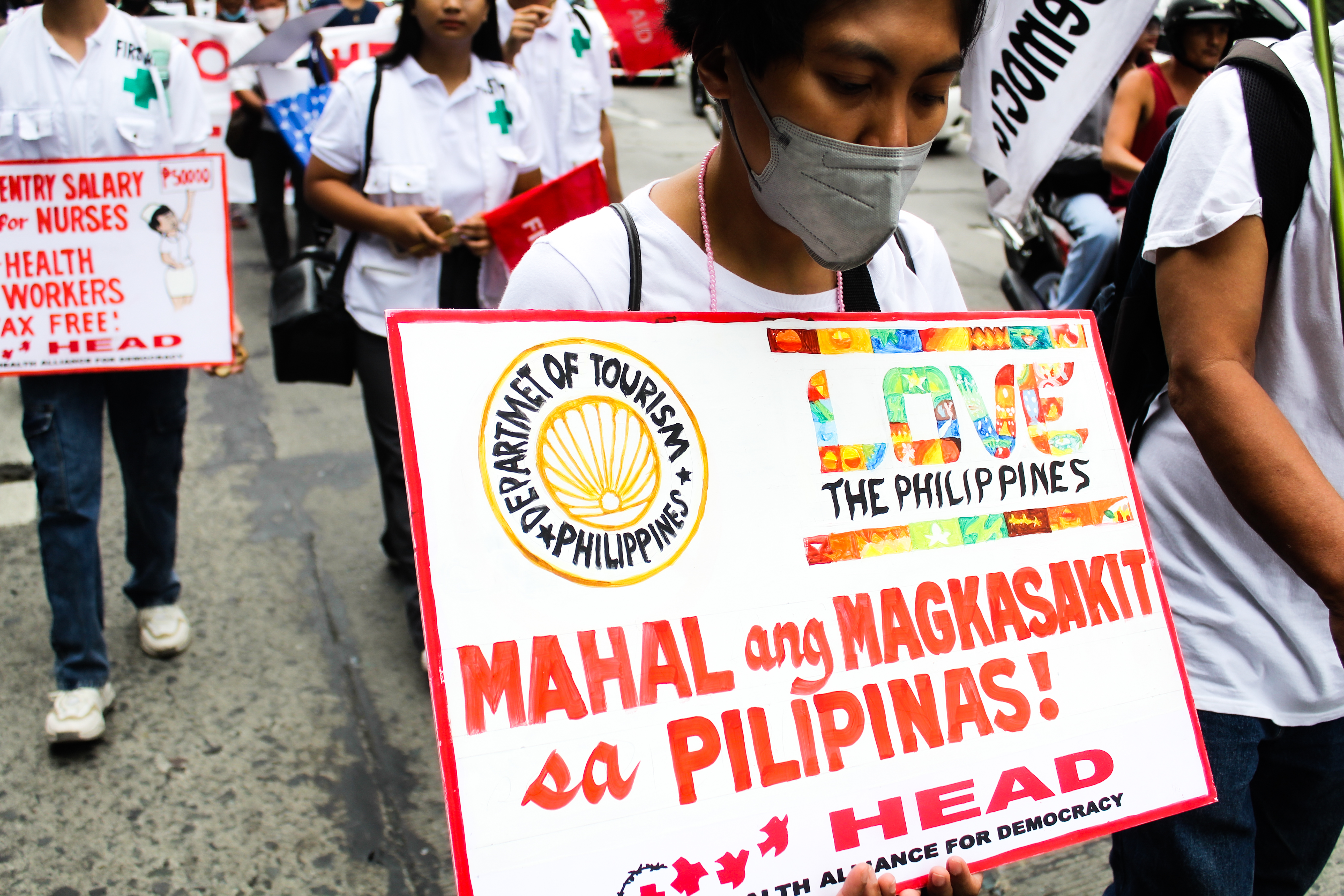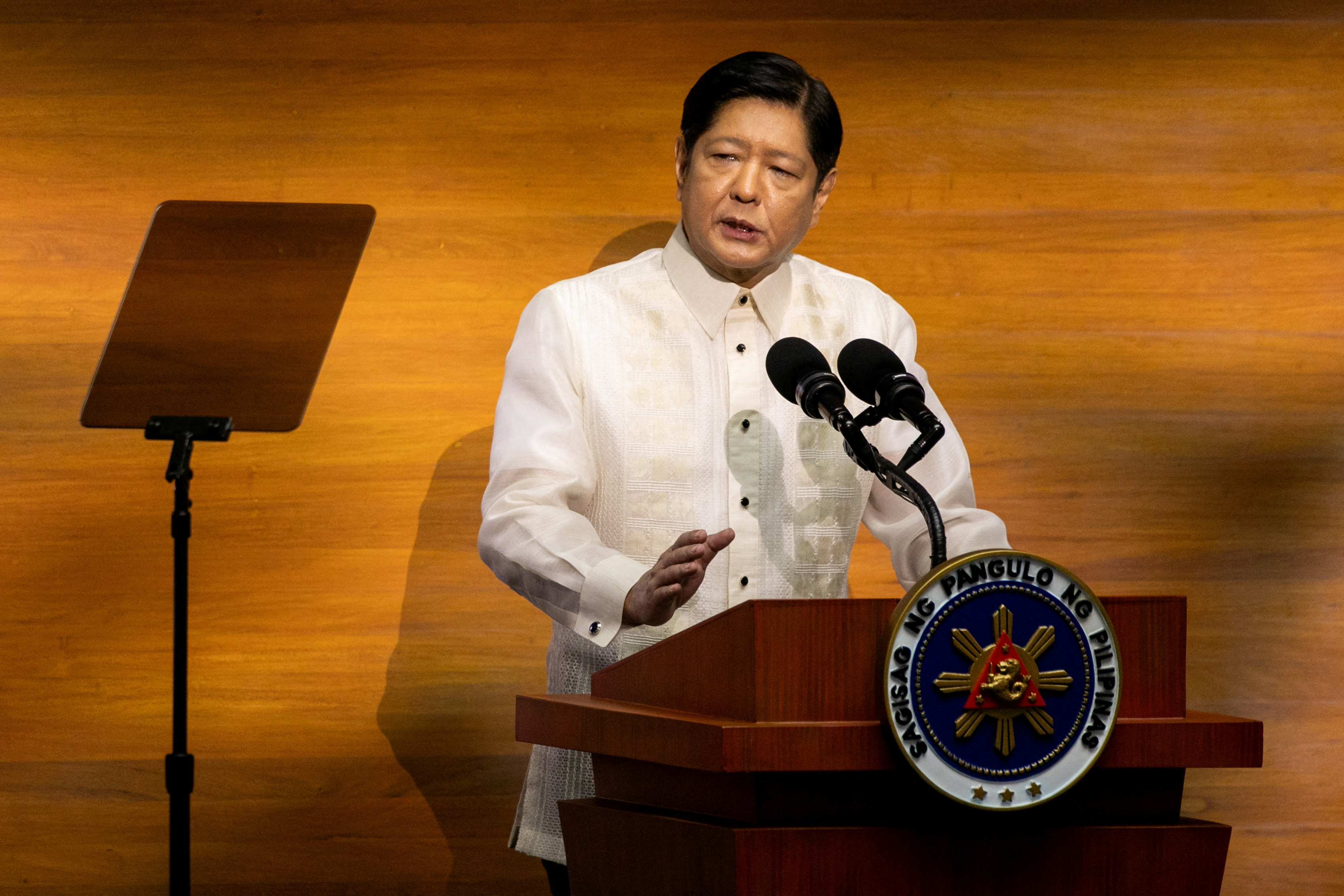
Manila, Philippines – Blaise Enosario, 36, has thought about working overseas ever since she entered nursing school.
After failing the nursing board exams the first time around, Enosario spent eight years preparing to take the test again before earning her licence last year.
Since August, Enosario has worked at a hospital in Laguna province, southeast of Manila, earning 700 Philippine pesos ($12.8) per 12-hour day.
But as soon as Enosario racks up more experience, she hopes to land a position abroad.
“You can’t build a life here,” Enosario told Al Jazeera. “When I get out, I’m not coming back. I’ll take my family with me.”
Enosario’s unhappiness with her pay and working conditions is not unusual in the Philippines, where an exodus of healthcare professionals has prompted the government to consider hiring unlicensed nursing graduates.
Under the plans announced by the Department of Health (DOH) last month, nursing graduates who have not passed the board exams would be granted a temporary licence to help fill 4,500 urgently-needed positions in government hospitals. To qualify for the temporary licence, graduates would need to receive a grade of at least 70 percent in the exam, which usually requires 75 percent to pass.
Nurses going overseas
For decades, the Philippines has been one of the biggest sources of nurses worldwide.
The DOH estimated in 2021 that 316,000 licensed Filipino nurses, or 51 percent of the total number of those qualified, had migrated overseas.
DOH Secretary Teodoro Herbosa has argued the recent change is necessary as hospitals are reducing their bed capacities due to being unable to meet nurse-to-patient ratios.
Herbosa has also said that firsthand work experience would be beneficial for graduates, many of whom have a hard time saving up and preparing for their exams.
“They contribute by filling in a vacancy,” Herbosa said during a press conference last month. “Then, most likely after working, in one or two tries, they can pass.”
A DOH spokesperson told Al Jazeera the changes would be implemented soon and it is also looking into “other pathways that are legally allowable and can be pursued to augment the health workforce with underboard nursing graduates”.
Carl Balita, who runs the largest chain of nursing study centres in the country, said he was happy to support the programme by offering free classes to nursing aides.
“Cooperation with the private sector is important to prevent our supply of nurses from being depleted,” Balita told Al Jazeera.
“If we can offer them the opportunities they need, then we would be able to keep them here to serve the Filipinos.”
Jocelyn Andamo, the secretary-general of Filipino Nurses United (FNU), however, said the government was avoiding “core issues” affecting nurses like low wages and poor working conditions.
“Many nurses handle up to 50 patients in one shift but are practically minimum wage earners,” Andamo told Al Jazeera.

For Enosario, the nurse in Laguna province, daily earnings amount to only about 15 percent more than the minimum wage in Metro Manila.
To make the move abroad, Enosario estimates she will need about 150,000 pesos ($2,755). But with little opportunity to build any savings, she is on the lookout for a loan or an arrangement with a placement agency.
The Ibon Foundation, a think tank based in Metro Manila, has estimated that a Filipino household must earn at least 1,147 pesos ($21) a day to meet a family’s basic needs and have any savings.
Conditions for everyday Filipinos have been exacerbated by the highest inflation in Southeast Asia, which over the past year has averaged 7.2 percent.
“The [President Ferdinand ‘Bongbong’] Marcos Jr administration is not doing enough for millions of poor households with little income and no savings who are being left behind,” Ibon said earlier this month.
According to data aggregators at IPrice, Filipino nurses receive some of the lowest wages in Southeast Asia.
A veteran nurse earning 40,381 pesos ($741.8) a month would still earn about 57 percent less than their counterpart in Vietnam, according to IPrice.
In 2018, a survey by the Department of Labor and Employment found that the monthly average wage for a nurse nationwide was just 14,942 pesos ($273.75), or 679 pesos ($12.47) a day.
Herbosa, the health secretary, has rejected the suggestion that higher wages would prevent nurses from seeking opportunities elsewhere. Speaking at last month’s press conference, he said he had asked nurses about the level of pay they would need to stay in the country and was told “just over 30,000 Philippine pesos ($551.12) and we’ll be happy.”
“It’s not salaries that will keep nurses in the Philippines,” said Balita, the study centre chain operator, arguing that the solution is to cultivate a “positive practice environment” that provides a clear career progression and a healthy work-life balance.
“What’s important is to make nurses feel the right recognition.”

Under the Philippine Nursing Act, which was passed more than 20 years ago but only entered into law in 2020, government hospitals are supposed to offer entry-level monthly salaries of at least 36,619 Philippine pesos ($672.72).
“We cradle life into this world, safeguard it, then usher it into the next,” said Andamo, the trade union leader. “Considering inflation and the expenses we shoulder, the salary should be better by now.”
The FNU has backed a bill by Congresswoman France Castro to standardise the entry-level pay of all nurses at 50,000 pesos ($918) a month, which she says will help ensure the “contributions and sacrifices of nurses are duly appreciated”.
In January, Mark Defensor, a former nurse at the Philippine Heart Center, took a plane to join his wife and son in Florida after the COVID-19 pandemic caused him to reassess his life.
Before lockdowns put an end to his construction side jobs, Defensor had planned to attend law school in the Philippines. Now he is hoping to get a nursing licence in the near future in the US.
“You can grow old happily here by just being a nurse,” Defensor told Al Jazeera.
Defensor said the neglect of nurses during the pandemic discouraged many from staying in the country or continuing in the profession altogether. Many shouldered the costs of their own PPEs and are waiting on 12.57 billion pesos ($231,021,641) in unpaid COVID allowances from the government.

Despite a state of emergency in the Philippines only lifting this week, President Ferdinand Marcos Jr has praised the country’s pandemic response.
“We have become victims of our own success in that the Filipinos did really well during the pandemic,” Marcos said earlier this month during a meeting with business executives. “So every leader I meet says ‘Can we have more Filipino med techs [medical technicians], doctors and nurses?’ So we’re having a shortage here,” he said.
But according to the Philippine Regulation Commission (PRC), there is no shortage of licensed nurses in the country. While many trained nurses are leaving the country, many others are leaving the profession altogether to do other jobs.
“There are so many nurses not in nursing,” said Defensor, who previously served as president of the Philippine Heart Center Employees.
“They’re in call centres or doing all kinds of online retail. But we need them. Would you let your mother be treated by a non-licensed nurse who might not be held accountable?”
In an appearance before the Senate in March, the PRC said that less than 54 percent of the nearly one million licensed nurses in the country are currently active. PRC Commissioner Jose Cueto recommended the DOH focus on hiring the 47,000 nursing graduates who entered the job market during the past three years.
Andamo said it is ironic for the government to complain about shortages when it laid off an estimated 10,000 nurses during the last two years. In 2021, an executive order shifted more healthcare responsibilities to local government units, many of which did not have the budget to absorb the medical personnel.
Marcos has pledged to work out deals with other countries to not only accept nurses but also help train an equivalent number to stay in the country. Andamo said such proposals avoid tackling the root of the problem.
“How can they not understand the problem? I’m shaken by their callousness. They just don’t care,” Andamo said.





.jpg?w=600)

